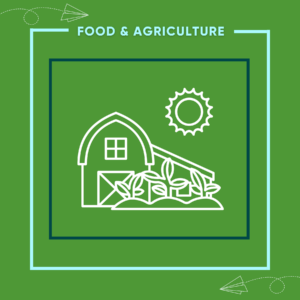Learn About the Industries
Everything we do as humans has an environmental cost and this extends to the industries we have created that propel our daily lives. This year in SOAR, we will be focusing on 6 industry types and their influences on our planet and our way of life. Explore each industry below to learn more about them, their impact on the environment, their role in environmental justice, and how these industries can become more environmentally conscious. You will learn:
- The basics of the industry
- Environmental impacts within that industry
- How the industry affects environmental justice
- Ways the industry can become more sustainable
Environmental Topics to Note Of
What is ESG?
ESG is an acronym that stands for Environmental, Social, and Governance and is a framework used to assess an organization’s business practices and performance on various sustainability and ethical issues. It also provides a way to measure business risks and opportunities in those areas. Investors will use ESG reports to determine which companies match their sustainability goals and values as a brand and for profitability. ESGs are influential for investors, companies, and consumers like you to divest from industries contributing to climate change and support companies that align with sustainable and ethical practices.
Environmental focuses on a company’s impact on the natural world, including its resource usage, emissions, waste management, and efforts toward sustainability and conservation. It assesses how a business operates in relation to ecological concerns and its contributions to mitigating climate change and other environmental challenges.
Social pertains to a company’s interactions with people and society at large. It encompasses factors such as employee relations, diversity and inclusion, community engagement, labor practices, human rights, and overall social impact, reflecting how a business affects and engages with various stakeholders beyond its financial performance.
Governance refers to the structure, processes, and oversight that guide a company’s decision-making and operations. It encompasses elements such as board composition, executive compensation, shareholder rights, transparency, and ethical behavior, reflecting the integrity and effectiveness of a company’s leadership and management practices.
What is Environmental Justice?
“Environmental Justice aims to minimize the environmental impacts on all people, advocating for fairer environmental policies and lawmaking, and installing greater protections for Black, Indigenous, and People of Color (BIPOC) communities.” For a history of Environmental Justice, check out this article.
- For more info about Environmental Justice, read this.
- For a quick video on Environmental Justice, click here.
The Federal Government created the Office of Environmental Justice to combat these injustices. With $3 billion in grants, the new Environmental Justice office will aim to give grants to environmentally unjust communities.
SOAR Industries
The industries we are focusing on this year in SOAR include:
- Consumer Goods
- Finance
- Technology
- Energy & Transportation
- Building Design & Construction
- Food & Agriculture
These large industries play a significant role in how they impact the environment. For example, it is estimated that the fashion industry uses over 20 trillion gallons of water to manufacture garments each year which causes about 20% of global industrial water pollution. Additionally, the fashion industry, within consumer goods, accounts for 10% of world carbon emissions annually. The same industry is also accountable for burning one garbage truckload worth of trash every second or sending it to the landfill. The finance industry invests heavily in the fossil fuel industry, which is responsible for 75% of global greenhouse gas emissions. In 2021, banks gave $742 billion to fossil fuel financing. Within transportation, the automotive industry produces a copious amount of air pollution and greenhouse gasses. Airplanes are a huge contributor to climate change because they release CO2 and nitrogen oxide, which has a strong warming effect on our atmosphere. In the agriculture industry, air emissions from livestock cause 14.5% of greenhouse gas emissions. Plus, the production of food creates mass soil erosion and waste issues. These are just a fraction of the environmental impacts of these industries.
These environmental concerns have not gone unnoticed. Tighter government regulations are forcing these industries to become more sustainable and reduce their environmental impacts. Industries are realizing that in the long term, these environmental policies are more cost-efficient. There are many benefits of becoming more sustainable such as increased productivity, improved image, and employee retainment, to name a few. Certain industries are already doing a phenomenal job altering their daily routines to become more environmentally mindful. Other industries are struggling and may need some assistance. In SOAR, you will first understand the environmental issues each industry faces in order to make an informed recommendation on how to create sustainable changes within that industry.
Please click on each industry below to learn more:
Next Step: Let’s move to Phase 2
Looking for Another Page? Head over to the Campaign’s Table of Contents.





